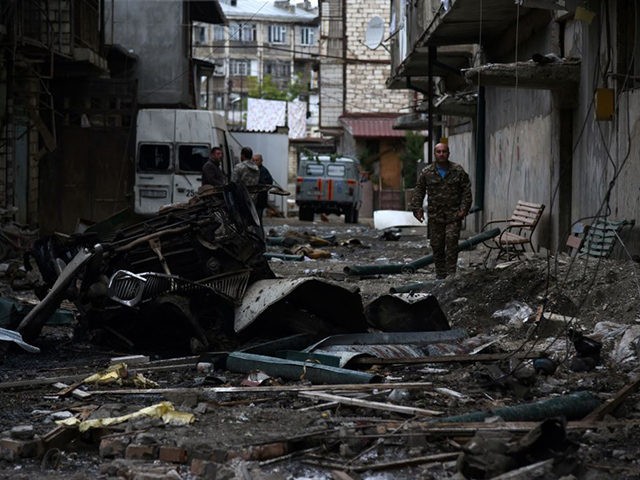Fighting in the Nagorno-Karabakh region escalated over the weekend, as Armenia and Azerbaijan accused each other of firing missiles and artillery at civilian infrastructure and launching attacks outside the conflict zone.
An aide to Azerbaijan’s President Ilham Aliyev said on Sunday that his country’s second-largest city, Ganja, was struck by “Armenia’s massive missile attacks against dense residential areas.” Ganja is well outside the Nagorno-Karabakh region. The aide claimed another city closer to the conflict zone, Beylagan, was also hit by Armenian missiles. Azerbaijan’s Foreign Ministry said one civilian was killed in Ganja.
Azerbaijan said on Sunday night that three missiles struck near the city of Mingacevir, the site of a major hydroelectric dam. Mingacevir is over sixty miles from the front line of the conflict.
“Delivering fire on the territory of Azerbaijan from the territory of Armenia is clearly provocative and expands the zone of hostilities,” Azeri Defense Minister Zakir Hasanov said.
The foreign ministry of Turkey, which strongly supports Azerbaijan in the conflict, condemned the reported Armenian attacks on civilian areas, calling them “a new manifestation of Armenia’s unlawful attitude.”
The Armenian Defense Ministry denied responsibility for the attacks and said that “no fire of any kind is being opened from the territory of Armenia in Azerbaijan’s direction.”
The leader of separatist forces in Nagorno-Karabakh, Arayik Harutyunyan, later said that he authorized “rocket attacks to neutralize military objects” in Ganja but halted the strikes to avoid civilian casualties. Harutyunyan’s office said an Azeri military airport in Ganja was destroyed by rocket fire, a claim denied by Azerbaijan.
Armenian-allied forces in Nagorno-Karabakh said on Monday that Azerbaijan launched its own rocket strikes on civilian targets, including the regional capital of Stepanakert and another town called Shushi. Stepanakert, which has a population of about 50,000, has reportedly been hit by heavy artillery fire every day since Friday.
The separatists said 223 of their soldiers have been killed over the past eight days. Azerbaijan does not release military casualty figures, although it does publicize how many civilians were allegedly killed by enemy attacks.
“Tense fights are in progress,” said the Armenian Defense Ministry, which dismissed Azeri claims of Armenia targeting civilians as “fake and complete misinformation.”
The Armenians dismissed Azeri claims of capturing several towns in Nagorno-Karabakh as “yet another fabrication.”
Azerbaijan additionally claimed on Sunday to have targeted and injured Arayik Harutiunian, leader of separatist forces in Nagorno-Karabakh, with an artillery barrage in retaliation for the rocket strike on Ganja.
Azerbaijan’s President Aliyev gave a fiery speech on Sunday in which he said military action would continue until Armenia announces a timetable for withdrawing all forces from Nagorno-Karabakh and surrounding territories.
“Azerbaijan has one condition, and that is the liberation of its territories,” said Aliyev. “Nagorno-Karabakh is the territory of Azerbaijan. We must return and we shall return. My condition is the following: let them withdraw their troops, and the confrontation will be stopped — but this should not be in words, but in deeds.”
Armenia’s Defense Ministry interpreted Aliyev’s speech as proof that “we are in a war.”
Analysts told Reuters the Azeris would seem to have an edge in that war, with almost twice as many soldiers as Armenia, air superiority over the region, and strategic initiative from beginning the conflict at a time of its choosing.
Azerbaijan also has substantial support from Turkey — including Syrian mercenaries shipped to the conflict zone by Turkey to fight on the front lines — while Armenia is so far enjoying mostly diplomatic support from Russia, which has a military base on Armenian soil.
French President Emmanuel Macron on Friday confronted Turkey about the hundreds of Syrian fighters pouring into the Armenia-Azerbaijan conflict. France’s AFP news service reported on Sunday that at least 64 Syrians sent by Turkey have died on the front lines.
The Moscow Times hypothesized on Monday that Azerbaijan hoped to overwhelm Armenia and rout its forces from Nagorno-Karabakh with a surprise attack last week, but the Armenians put up more resistance than expected, so the “theater of war has expanded quite significantly.” For their part, the Armenians evidently did not expect Azerbaijan to strike so hard after ethnic Armenian separatists in Nagorno-Karabakh moved forward with their plans to create a “Republic of Astrakh” integrated with Armenia.
The Moscow Times saw a religious dimension to the conflict, in addition to nationalist overtones on both sides:
Although most Azerbaijanis are Shia Muslims, a significant number of Azerbaijani Muslims have, in the past decade, converted to Sunni Islam, and many have embraced the more extreme forms of Salafi/Wahhabism. They therefore may welcome the presence of Sunni Syrian jihadists fighting on their behalf.
Even if some Syrian fighters in Azerbaijan may be there for the money, it cannot be excluded that many may be joining the war for ideological reasons. For them, and for the Azeris, the Shia/Sunni divide may no longer be of much relevance.
Rightly or wrongly, the war could easily be portrayed as a “defensive jihad” in which Muslims are helping to liberate traditional “Muslim lands” from the control of Christian Armenians.
The surprise attack might not have been a complete success, but the Moscow Times, like Reuters, judged Azerbaijan to have the upper hand in the conflict to date, so unless the tide of the conflict is reversed, Armenia may soon be forced to the bargaining table in an unfavorable position.

COMMENTS
Please let us know if you're having issues with commenting.